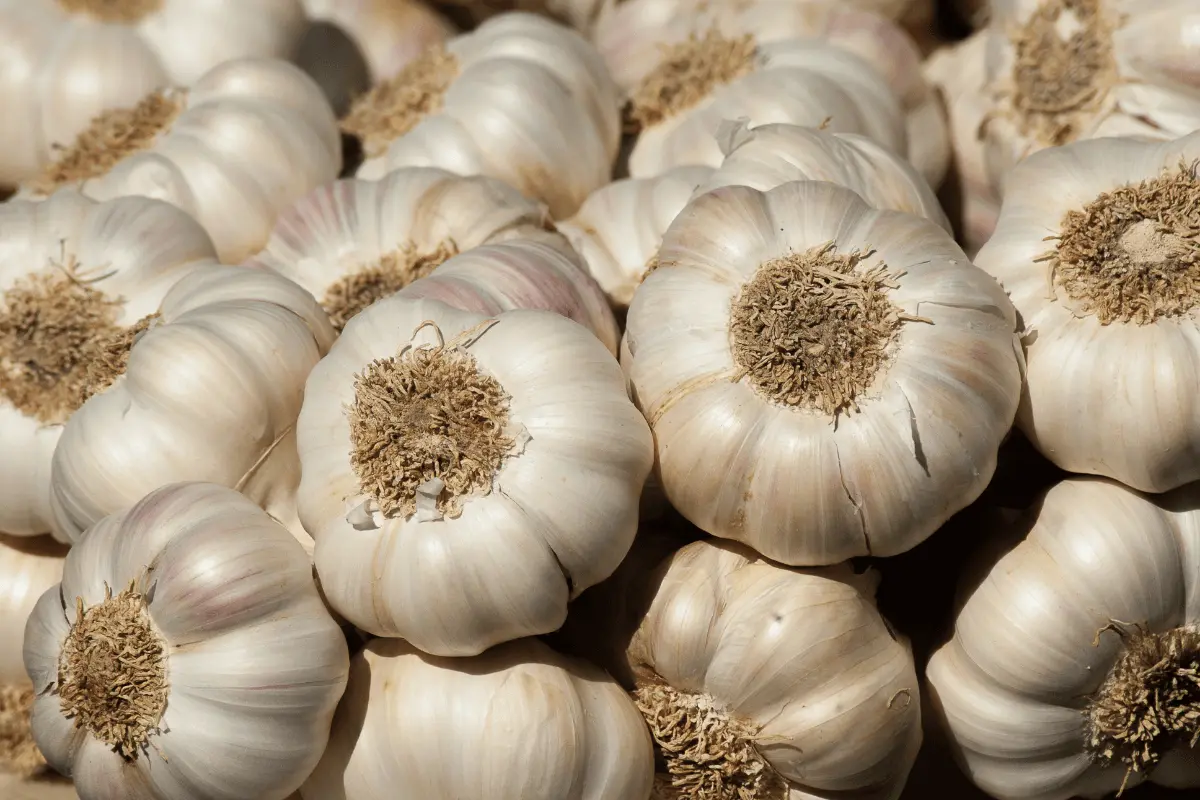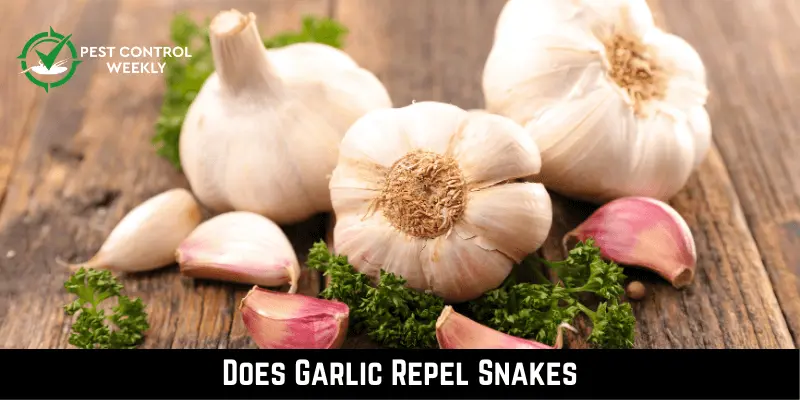Have you ever wondered if the items in your kitchen pantry may be the key to warding off snakes and other creepy crawlers? The question “Does garlic repel snakes?” may sound odd, yet it is really rooted in centuries of tradition, tales, and even certain strands of contemporary approaches to snake care.
Yes, garlic repels the snakes away. It is thought that this plant’s powerful aroma will confuse these reptiles’ senses, thereby discouraging them from approaching our territory. However, this argument is scientifically dubious and should be further investigated and debated.
Intrigued? Let’s learn more about this interesting topic, which is like a maze where fact meets folklore and traditional knowledge meets scientific skepticism.
Garlic: The Superfood With Super Powers

Garlic, a staple in any kitchen, is good for more than just its flavor. The remarkable advantages that this common bulbous plant offers might surprise even the most seasoned dietitians. Garlic is often regarded as a superfood due to the abundance of beneficial elements it provides.
Allicin, one of its active compounds, is a powerful elixir that helps with cardiovascular health, blood pressure, and immune system function. Due to its near-miraculous properties, this garlic is a top pick among health nuts everywhere.
Garlic’s Medicinal Properties
Garlic is the indisputable champion of the medicinal world. Its medicinal power is ancient, and it has been accepted by conventional medicine. Allicin, one of the organosulfur compounds it contains, is a powerful antibacterial agent that can protect against a wide variety of dangerous infections.
Oxidative stress is a foundation of chronic illnesses, and garlic shows promise in combating it. Garlic has an advantageous place among therapeutic foods due to its ability to improve cardiovascular health, promote digestive health, and maybe even prevent cancer.
Garlic’s Use in Pest Control
Garlic has established itself in a field far apart from its traditional spheres of use, such as pest management. Many bugs are repulsed by garlic because of its strong odor, which is pleasant to humans. It’s used to keep away mosquitoes, aphids, and even larger pests like snakes, and deer, and it doesn’t harm the environment.
The intriguing claim that it may deter snakes from a distance has yet to be verified scientifically. However, the prospect of a non-chemical approach to pest control is appealing. Therefore, there is a need for greater research into the effectiveness of garlic as a pesticide.
How to Use Garlic as a Snake Repellent?
Garlic, a common ingredient in traditional cures, may work as a novel and environmentally friendly snake repellent, drawing on traditional wisdom and experience. A simple yet effective homemade repellent may be constructed using its strong odor:
- Add a cup of mineral oil to a handful of crushed garlic cloves.
- Let the garlic flavor in this mixture soak for a day or two.
- Strain the infused oil and combine it with water in a spray bottle for convenient application.
- Spray this concoction about the outside of your home, especially in locations where snakes like to hang around.
- However, keep in mind that this approach has yet to be scientifically confirmed to work.
Does Garlic Affect Snakes?
Yes, garlic affects snakes. Garlic is widely sold as a snake repellent in the context of snake control. It is speculated that the reptiles are repelled by the distinctively strong odor of garlic. The sulfurous components in garlic, so the belief goes, may overwhelm a snake’s sense of smell, which will scare it away. It’s important to remember that snakes are tough, adaptable animals, and whether or not garlic works as a solo deterrent is debatable.
The Connection Between Garlic and Snakes
Age-old mythology and anecdotal evidence, rather than scientific analysis, are the source of the snake-garlic connection. According to conventional belief, the strong odor of garlic causes snakes to become confused and flee the area.
Reptilian behavior and navigation rely heavily on a chemosensory organ called Jacobson’s organ, which may be affected. While intriguing, this idea requires more empirical support to be taken seriously.
Garlic As A Snake Repellent
Anecdotal evidence and home remedy guides are mostly responsible for garlic’s reputation as a snake repellant. Many people believe that using garlic oil or infusions in their homes would deter snakes. Such approaches may appear risk-free and environmentally beneficial, but their efficacy is still up for debate.
Scientific Backing
While the concept of using garlic as a snake deterrent is fascinating, it is important to emphasize that the theory currently lacks scientific support. While it has been hypothesized that powerful odors like garlic may alter snake behavior, definitive proof is still lacking.
It is advisable to depend on expert, tried, and true techniques of snake handling until there is substantial scientific proof to back these statements. The safety of human beings and nonhuman animals alike must always come first.
Other Garlic-Based Snake Repellents
There are commercially marketed snake repellents that include garlic as an active ingredient. Garlic extracts are sometimes combined with other powerful components like essential oils or sulfur to increase their effectiveness in these. To ensure the product’s safety for usage around dogs and children, read and follow the directions on the packaging carefully. For all the interest in garlic’s potential as a snake deterrent, it’s important to keep in mind that the best way to keep snakes away is to keep your yard clear of debris.
Pros and Cons of Using Garlic as a Snake Repellent
Garlic’s benefits as a snake deterrent include the following:
- Eco-friendly: Instead of using potentially dangerous chemicals, you may use nature’s abundance by using garlic as a snake repellent.
- Cost-Effective: Compared to store-bought repellents, garlic is a cheap and convenient option because it is a common household item.
- Easy to Implement: Garlic-based mixes are simple to prepare and may be quickly applied to problem areas around your home.
- Non-Toxic: Garlic is completely safe for human and animal consumption.
The use of garlic as a snake deterrent has a few drawbacks:
- Lack of Scientific Evidence: Garlic’s supposed ability to deter snakes is somewhat questionable due to an absence of supporting scientific evidence.
- Temporary Solution: Garlic is a temporary solution, but its effectiveness may wear off after some time or be washed away by rain.
- Selective Effectiveness: However, garlic may not be helpful against all snake species. Therefore, its use should be carefully considered.
- Unintended Consequences: Garlic’s pungent odor may have unintended consequences on non-target species, upsetting the ecosystem.
- Ineffectiveness Against Persistent Invaders: Garlic may not be enough of a deterrent for snakes motivated by hunger or seeking refuge.
Although garlic may be effective as a snake deterrent, it shouldn’t be used alone; rather, it should be incorporated into a comprehensive strategy for dealing with snakes on your property.
Conclusion
In the end, garlic repels snakes based on anecdotes and mythology. Natural pest management enthusiasts like its eco-friendliness, accessibility, and non-toxicity to humans and pets. Its snake-repelling efficacy needs to be tested. Garlic may help reduce snakes, but using it alone may have mixed results.
It may require regular reapplication and may harm non-target species. Garlic should only be used with cinnamon or commercial repellents with professional assistance.Garlic is not a substitute for expert snake control or a clutter-free environment. Pest management should prioritize human and animal safety.
FAQs
How Do Snakes React to Garlic?
Anecdotal reports of snakes hiding from garlic smell indicate this may be the case. Some have speculated that the strong odor makes the area less pleasant because it distorts their sense of smell. However, this assertion is only speculative if it is backed by substantial scientific evidence.
Do Snakes Hate Cinnamon And Garlic Together?
Both garlic and cinnamon have aromas that are unpleasant to snakes. Even though these chemicals are sometimes used together as a snake deterrent in home medicines, little scientific evidence supports this practice. Therefore, the question of whether or not they work together is still open.
Do Copperheads Hate Garlic?
Many people believe that the pungent odor of garlic may repel Copperheads and other snakes, although any hard evidence does not support this belief. It’s worth noting that different snake species may react differently to different compounds, and there is no conclusive evidence that garlic is useful against Copperheads.
Are There Any Drawbacks To Using Garlic As A Snake Repellent?
Several possible negatives exist; thus, the answer is yes. Cons include:
- The requirement for regular reapplication.
- The possibility of ineffectiveness against some snake species.
- The potential disturbance of non-target fauna owing to the strong odor of garlic.
Can I Use Garlic In Combination With Other Snake Repellents?
Adding garlic to other repellents is possible. Some people try to boost the potency of garlic by combining it with other strong-smelling items, such as cinnamon or essential oils. It is important to talk to an expert in pest control before using these mixes, though, to be sure they will be safe and successful.
Will The Smell Of Garlic Attract Other Pests?
Despite its reputation as a pest preventive, garlic may actually attract insects that are drawn to pungent odors. When implementing any type of pest control approach, it is crucial to take into account the local ecology and fauna.

